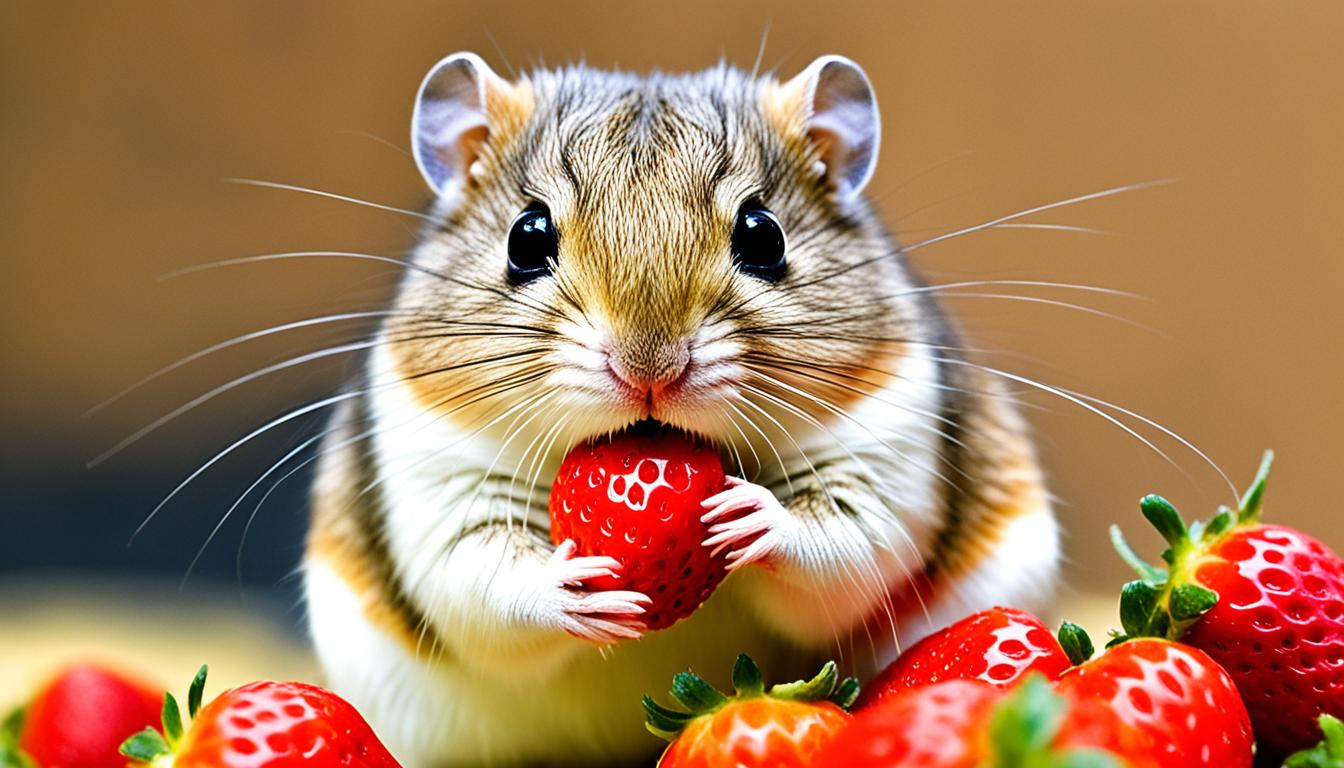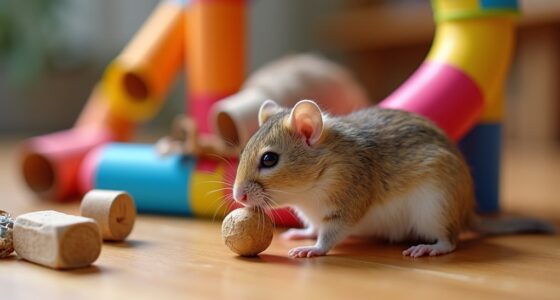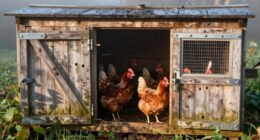Gerbils are lively tiny pets that love digging, running through tunnels, and exploring their environment. They have excellent memories and enjoy socializing with other gerbils, which helps prevent boredom. These curious creatures are great at burrowing and need a spacious habitat with tunnels, hiding spots, and fresh bedding. They eat a mix of seeds, grains, and vegetables, and stay active for many hours a day. Keep discovering more fascinating facts about these energetic rodents as you learn more!
Key Takeaways
- Gerbils are social animals that thrive in pairs or groups and enjoy burrowing and exploring their habitat.
- They have a strong sense of smell and use their whiskers to navigate and find food.
- Gerbils can jump up to 12 inches high, so their cage should have a secure lid.
- They are active during the day and love to run, climb, and dig in their environment.
- Gerbils can live up to 3 years with proper care, making them fun and interesting pets.

Gerbils are small, energetic creatures that make fascinating pets and interesting subjects for curious minds. When considering keeping one, it’s important to understand their needs, especially their habitat and diet. Your gerbil’s habitat isn’t just a cage; it’s a mini ecosystem where they feel safe, secure, and comfortable. You should provide a spacious cage with a solid bottom, filled with bedding that’s soft yet absorbent, like aspen shavings or paper-based bedding. Gerbils love to burrow and dig, so including tunnels, hiding spots, and climbing structures will keep them active and happy. Keep the cage in a quiet area, away from direct sunlight or drafts, to mimic their natural environment and reduce stress. Regular cleaning is key—spot-clean daily and do a full clean weekly—to prevent odors and maintain a healthy space for your pet. Providing a safe environment is essential to prevent injuries and keep your gerbil healthy. Creating a proper habitat setup that mimics their natural burrowing behavior can also help prevent boredom and promote mental stimulation. Additionally, ensuring proper habitat setup can help promote their overall health and well-being.
Knowing what your gerbil eats is equally important to keep them healthy and energetic. Their diet mainly consists of commercial gerbil food, which contains a balanced mix of seeds, grains, and pellets formulated specifically for their nutritional needs. You can supplement this with fresh vegetables like carrots, broccoli, or spinach, but avoid giving them anything toxic, such as onions, garlic, or citrus fruits. Fresh water must always be available, preferably in a water bottle that attaches to the cage, to keep it clean and free from contamination. Treats like sunflower seeds or small bits of dried fruit can be given sparingly—they’re great for training or bonding but shouldn’t be a staple. It’s a good idea to offer variety to prevent boredom and ensure they get a wide range of nutrients. Additionally, providing a proper habitat environment can help promote their overall health and well-being.
Frequently Asked Questions
How Long Do Gerbils Typically Live in Captivity?
Gerbils typically live about 2 to 4 years in captivity, depending on their care and environment. Their lifespan can vary based on diet, living conditions, and overall health. If you provide a clean cage, proper nutrition, and regular vet visits, you can help extend their captivity duration. Understanding your gerbil’s needs guarantees they stay happy and healthy throughout their gerbil lifespan.
Can Gerbils Be Kept Alone or Do They Need Companions?
Think of gerbils like tiny social butterflies—they thrive on companionship. Keeping a gerbil alone isn’t ideal, as their solitary behavior can lead to loneliness and stress. They have strong social needs, so it’s best to keep them in pairs or groups. By doing so, you help your pet stay happy and healthy, ensuring they don’t feel like a lone wolf in a big, empty forest.
What Is the Best Diet to Keep Gerbils Healthy?
You should feed your gerbil a balanced diet of high-quality hamster mix, supplemented with fresh vegetables and occasional seeds. To support their health, encourage regular gerbil exercise routines with a wheel and tunnels. Remember, gerbil social behaviors mean they thrive in pairs or groups, so guarantee their diet keeps them active and healthy. Proper nutrition and activity promote a happy, healthy gerbil, preventing obesity and other health issues.
Do Gerbils Require Special Bedding or Habitat?
You need to choose the right bedding options to guarantee your gerbil’s comfort and health. A proper habitat setup includes using safe, absorbent bedding like paper-based or aspen shavings, avoiding pine or cedar. Provide a spacious cage with tunnels, a wheel, and nesting areas. Regularly clean the habitat to prevent odors and maintain hygiene. This setup keeps your gerbil comfortable, active, and happy.
Are Gerbils Good Pets for Young Children?
Imagine a tiny friend who’s full of energy and curiosity—are gerbils good pets for young children? They can be, if you’re ready to supervise and understand their gerbil behavior. With gentle gerbil training, your child can learn patience and responsibility. Keep in mind, gerbils are social and active, making them a delightful but delicate addition. They thrive with proper care and interaction, turning your home into a lively, adorable habitat.
Conclusion
Now that you know these fun gerbil facts, you’re like a treasure hunter uncovering hidden gems. Gerbils are tiny explorers, full of surprises and charm. By understanding what makes them special, you can become a true gerbil guardian, ensuring they stay happy and healthy. Remember, caring for your gerbil is like tending a delicate, lively garden—nurture it with love, and watch your little friend thrive and brighten your days.









